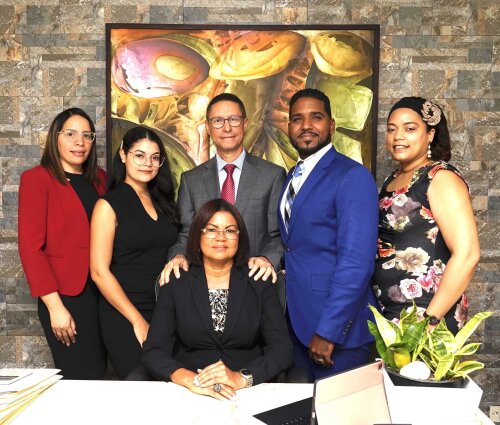Best Annulment Lawyers in Sosua, Cabarete
Share your needs with us, get contacted by law firms.
Free. Takes 2 min.
Free Guide to Hiring a Family Lawyer
List of the best lawyers in Sosua, Cabarete, Dominican Republic
About Annulment Law in Sosua, Cabarete, Dominican Republic
Annulment is a legal process that declares a marriage null and void, as if it never legally existed. In Sosua and Cabarete, located in the Puerto Plata province of the Dominican Republic, annulments are governed by national civil law but can have local nuances in their application. Unlike divorce, which ends a valid marriage, an annulment recognizes that, due to specific reasons, the marriage was never legally valid from the start. This distinction is important for both residents and foreigners, especially considering that these areas are popular for both tourism and expatriate living.
Why You May Need a Lawyer
Navigating the annulment process in Sosua and Cabarete can be complex, particularly if you are unfamiliar with Dominican law or face language barriers. Here are some common situations where legal help is essential:
- If you believe your marriage was entered into under false pretenses, coercion, or fraud
- If consent was missing at the time of marriage
- If one or both spouses were underage or lacked the capacity to marry
- If you are a foreigner and unsure how local laws differ from those in your home country
- If your marriage was not registered correctly or legally in the Dominican Republic
- If you need to protect property rights or child custody affected by an annulled marriage
A qualified lawyer in Sosua or Cabarete will help ensure the proper documentation is gathered, advocate on your behalf in court, and provide guidance on the legal consequences of annulment.
Local Laws Overview
The laws governing annulments in the Dominican Republic, and by extension Sosua and Cabarete, are primarily set out in the Civil Code. Key legal grounds for annulment include:
- Lack of consent from one or both parties
- Duress or coercion at the time of marriage
- Fraud, such as hiding key information like previous marriages or infertility
- Marriage between relatives prohibited by law
- Bigamy – if one spouse was already married at the time
- One or both parties were under the legal minimum age without parental or court approval
The annulment process involves submitting a petition to the appropriate local court, presenting evidence, and potentially appearing in court. The proceedings and required documents can vary, especially regarding foreign nationals or if the marriage took place outside the Dominican Republic but needs to be annulled for legal reasons within the country.
Frequently Asked Questions
What is the difference between annulment and divorce?
An annulment declares a marriage legally invalid as if it never took place, while a divorce ends a legally valid marriage.
Can foreigners get an annulment in Sosua or Cabarete?
Yes, foreigners can seek annulment in the Dominican Republic if the marriage was registered there or if legal interests are affected locally.
What are the main grounds for annulment?
Common grounds include lack of consent, fraud, duress, incapacity, underage marriage, bigamy, and prohibited degrees of kinship.
How long does the annulment process take?
The timeline varies, but annulments typically take several months depending on the complexity of the case and court schedules.
What documents are required for an annulment?
Typical documents include the marriage certificate, identification for both parties, evidence supporting the grounds for annulment, and possibly proof of residency.
Will an annulment affect child custody or property rights?
Yes, an annulment can impact child custody and division of property. Legal advice is recommended to protect your interests.
Do both spouses have to agree to an annulment?
No, one spouse can file for an annulment, but the process may be simpler if both agree.
Is the annulment recognized outside the Dominican Republic?
Recognition of a Dominican annulment abroad depends on the laws of the other country. Check with local authorities or consult an attorney familiar with international law.
Does annulment mean my children become illegitimate?
No. The Civil Code of the Dominican Republic preserves the rights and status of children even if the marriage is annulled.
Do I need to appear in court for an annulment?
In most cases, at least one appearance is required, but your lawyer can advise you on what is expected based on your situation.
Additional Resources
For those seeking more information or assistance with annulment in Sosua or Cabarete, these resources can be helpful:
- Juzgado de Paz (Peace Court) in Sosua and Cabarete – Handles civil matters, including annulments.
- Dominican Civil Registry (Oficina Central del Estado Civil) – For certified copies of marriage and birth certificates.
- Bar Associations in Puerto Plata Province – For a list of qualified lawyers experienced in family and civil law.
- Ministry of Foreign Affairs – For matters involving international marriage recognition.
- Legal aid clinics – Some local organizations may provide free or low-cost legal guidance for qualifying individuals.
Next Steps
If you believe you have grounds for annulment and require legal assistance, consider these actions:
- Gather all existing documentation related to your marriage, residency, and any evidence supporting your claim for annulment.
- Consult a licensed attorney in Sosua or Cabarete familiar with annulment procedures and Dominican civil law.
- Schedule a legal consultation to assess your specific circumstances and receive customized advice.
- Follow your lawyer’s instructions regarding court appearances, document translations, and additional requirements.
- Stay informed throughout the process and do not hesitate to seek explanations if any part of the legal process is unclear.
An annulment is a significant legal procedure. Taking the right steps early with trustworthy legal guidance will help protect your rights and ensure a smoother process.
Lawzana helps you find the best lawyers and law firms in Sosua, Cabarete through a curated and pre-screened list of qualified legal professionals. Our platform offers rankings and detailed profiles of attorneys and law firms, allowing you to compare based on practice areas, including Annulment, experience, and client feedback.
Each profile includes a description of the firm's areas of practice, client reviews, team members and partners, year of establishment, spoken languages, office locations, contact information, social media presence, and any published articles or resources. Most firms on our platform speak English and are experienced in both local and international legal matters.
Get a quote from top-rated law firms in Sosua, Cabarete, Dominican Republic — quickly, securely, and without unnecessary hassle.
Disclaimer:
The information provided on this page is for general informational purposes only and does not constitute legal advice. While we strive to ensure the accuracy and relevance of the content, legal information may change over time, and interpretations of the law can vary. You should always consult with a qualified legal professional for advice specific to your situation.
We disclaim all liability for actions taken or not taken based on the content of this page. If you believe any information is incorrect or outdated, please contact us, and we will review and update it where appropriate.










